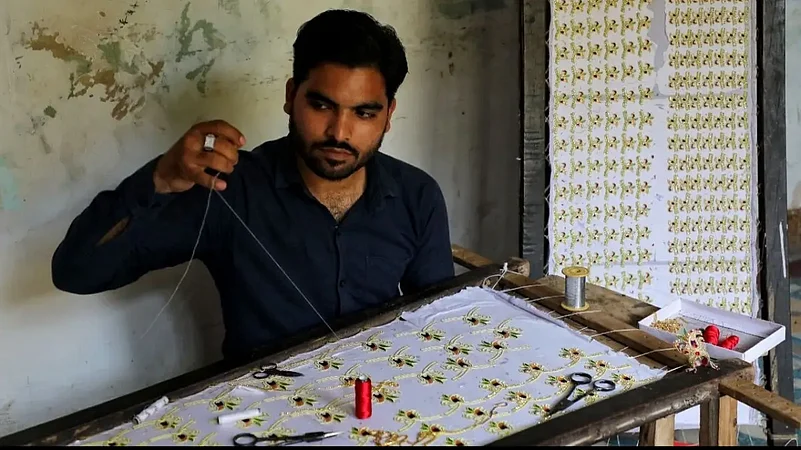A 100-meter walk from Katra Keshav Dev Temple of Lord Krishna in Mathura lives Md Barkat Ali, an artist who makes embroidered outfits for Lord Krishna. He calls it the work of “Thakur ji” – one of the many names with which the Hindu deity is referred to in Mathura, Uttar Pradesh. Ali makes outfits, crowns, and ornaments for Krishna. The artist’s intricate work has made him a name across India.
“This epitomises the harmony and peace with which Hindus and Muslims live here in Mathura,” Ali said. Over 1,500-2,000 Muslim workers and artists of Mathura and Vrindavan have the same profession. Their livelihood depends on it. Muslims of the area have honed the craft of the divine dress-making and made it their own.
“During festivals like Diwali, Janmashtami, Holi, we get more orders. Covid-19 had halted everything but now things are recovering,” Ali says. On average, each worker makes around Rs 10-15 thousand a month, he adds.
These Muslim craftsmen of Mathura say that they have dedicated themselves in the service of lord Krishna. “This is the beauty of India and also of Mathura, proof of how we love each other. This is the India our forefathers had imagined where we respect each other’s religion,” Ali adds with a sigh.
In Vrindavan, Mathura, which is the birthplace of Lord Krishna, there are hundreds of shops selling outfits and crowns worn by different Hindu gods. These garments and ornaments are exported the world over, especially in countries where ISKCON (International Society for Krishna Consciousness) has its centers. “Many foreigners come to buy what we make. They often ask for specific designs, which we provide them,” says Ali. Manufacturers of Mathura and Vrindavan say that this is the industry of crores. Clothes and other accessories worth Rs 4-5 crores are exported to various countries – especially the UK and US.
Naimuddin, another artist in Mathura, adds that “special demand comes from ISKCON temples of US and UK and we happily provide them. This is not the question of money, but our sentiments. We are deeply connected with “Thakur ji”. If his idol is decorated well, it gives us immense happiness.”
Most of the workers in Vrindavan and Mathura are migrant labourers from nearby cities and villages, who came here and settled for work. For many families, this is an intergenerational work. “From the smallest of small temples to the biggest, we make a full set – dhoti (bottom wear), patka, and mukut (crown),” said Naimuddin, “We are deeply connected to this work at a spiritual level. Serving Radha rani and lord Krishna is rewarding. We get peace and happiness while doing it,” he adds. “This work is purely handicraft-based. We don’t use machines, we do it by hand.”
However, the dispute over the birthplace of Lord Krishna – which Hindus believe is under the Shahi Idgah mosque adjacent to the Katra Keshav Dev temple, has led to concern among the Muslin artisans. Many fear that the case will aggravate communal tensions in the region and hamper business as well as the unique cultural ethos of the city. “Mathura is known for Hindu-Muslim harmony. We should not fight over mandir-masjid. It will affect the peace and economy of Mathura,” Ali tells Outlook.
Naimuddin agrees with Ali that all of this was being done for politics and vested interests. “It is being done to distort the peace of the city of Thakur ji,” he contends.





















